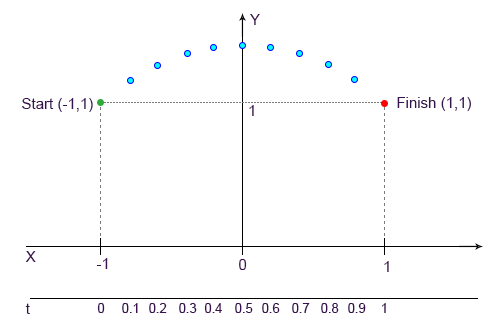In unity3D you can declare a Vector3 like this: var myVector = Vector3(1,2,1); Your code has the following faults: You didn't write var before cubeVector; You didn't end your line with. “unity vector3 to array” Code Answer’s. Unity vector3 to array. Csharp by Annoying Angelfish on Mar 30 2020 Donate. 0 unity easy convert vector3 to vector2. Csharp by Foolish Flatworm on Oct 02 2020 Donate. Source: gamedev.stackexchange.com. Add a Grepper Answer. C# answers related to “unity vector3 to array”.
 -->
-->Definition
Represents a vector with three single-precision floating-point values.
Unity Vector3 Angles
- Implements

Remarks
The Vector3 structure provides support for hardware acceleration.
For matrix transformations, the Vector2, Vector3, and Vector4 instances are represented as rows: a vector v is transformed by a matrix M with vM multiplication.
Constructors
| Vector3(Single) | Creates a new Vector3 object whose three elements have the same value. |
| Vector3(Single, Single, Single) | Creates a vector whose elements have the specified values. |
| Vector3(Vector2, Single) | Creates a new Vector3 object from the specified Vector2 object and the specified value. |
Unity Vector3 Magnitude
Fields
| X | The X component of the vector. |
| Y | The Y component of the vector. |
| Z | The Z component of the vector. |
Properties
| One | Gets a vector whose 3 elements are equal to one. |
| UnitX | Gets the vector (1,0,0). |
| UnitY | Gets the vector (0,1,0). |
| UnitZ | Gets the vector (0,0,1). |
| Zero | Gets a vector whose 3 elements are equal to zero. |
Methods
| Abs(Vector3) | Returns a vector whose elements are the absolute values of each of the specified vector's elements. |
| Add(Vector3, Vector3) | Adds two vectors together. |
| Clamp(Vector3, Vector3, Vector3) | Restricts a vector between a minimum and a maximum value. |
| CopyTo(Single[]) | Copies the elements of the vector to a specified array. |
| CopyTo(Single[], Int32) | Copies the elements of the vector to a specified array starting at a specified index position. |
| Cross(Vector3, Vector3) | Computes the cross product of two vectors. |
| Distance(Vector3, Vector3) | Computes the Euclidean distance between the two given points. |
| DistanceSquared(Vector3, Vector3) | Returns the Euclidean distance squared between two specified points. |
| Divide(Vector3, Single) | Divides the specified vector by a specified scalar value. |
| Divide(Vector3, Vector3) | Divides the first vector by the second. |
| Dot(Vector3, Vector3) | Returns the dot product of two vectors. |
| Equals(Object) | Returns a value that indicates whether this instance and a specified object are equal. |
| Equals(Vector3) | Returns a value that indicates whether this instance and another vector are equal. |
| GetHashCode() | Returns the hash code for this instance. |
| Length() | Returns the length of this vector object. |
| LengthSquared() | Returns the length of the vector squared. |
| Lerp(Vector3, Vector3, Single) | Performs a linear interpolation between two vectors based on the given weighting. |
| Max(Vector3, Vector3) | Returns a vector whose elements are the maximum of each of the pairs of elements in two specified vectors. |
| Min(Vector3, Vector3) | Returns a vector whose elements are the minimum of each of the pairs of elements in two specified vectors. |
| Multiply(Single, Vector3) | Multiplies a scalar value by a specified vector. |
| Multiply(Vector3, Single) | Multiplies a vector by a specified scalar. |
| Multiply(Vector3, Vector3) | Returns a new vector whose values are the product of each pair of elements in two specified vectors. |
| Negate(Vector3) | Negates a specified vector. |
| Normalize(Vector3) | Returns a vector with the same direction as the specified vector, but with a length of one. |
| Reflect(Vector3, Vector3) | Returns the reflection of a vector off a surface that has the specified normal. |
| SquareRoot(Vector3) | Returns a vector whose elements are the square root of each of a specified vector's elements. |
| Subtract(Vector3, Vector3) | Subtracts the second vector from the first. |
| ToString() | Returns the string representation of the current instance using default formatting. |
| ToString(String) | Returns the string representation of the current instance using the specified format string to format individual elements. |
| ToString(String, IFormatProvider) | Returns the string representation of the current instance using the specified format string to format individual elements and the specified format provider to define culture-specific formatting. |
| Transform(Vector3, Matrix4x4) | Transforms a vector by a specified 4x4 matrix. |
| Transform(Vector3, Quaternion) | Transforms a vector by the specified Quaternion rotation value. |
| TransformNormal(Vector3, Matrix4x4) | Transforms a vector normal by the given 4x4 matrix. |
Operators
Unity Vector3.forward
| Addition(Vector3, Vector3) | Adds two vectors together. |
| Division(Vector3, Single) | Divides the specified vector by a specified scalar value. |
| Division(Vector3, Vector3) | Divides the first vector by the second. |
| Equality(Vector3, Vector3) | Returns a value that indicates whether each pair of elements in two specified vectors is equal. |
| Inequality(Vector3, Vector3) | Returns a value that indicates whether two specified vectors are not equal. |
| Multiply(Single, Vector3) | Multiples the scalar value by the specified vector. |
| Multiply(Vector3, Single) | Multiples the specified vector by the specified scalar value. |
| Multiply(Vector3, Vector3) | Returns a new vector whose values are the product of each pair of elements in two specified vectors. |
| Subtraction(Vector3, Vector3) | Subtracts the second vector from the first. |
| UnaryNegation(Vector3) | Negates the specified vector. |
Unity Vector3 To Float
Extension Methods
Vector2 Unity
| AsVector128(Vector3) | Reinterprets a Vector3 as a new Vector128<T>. |
Applies to
